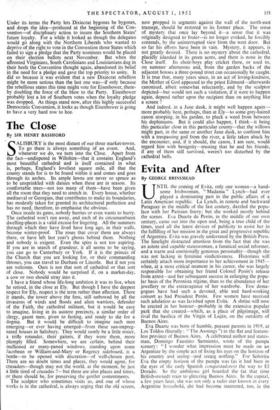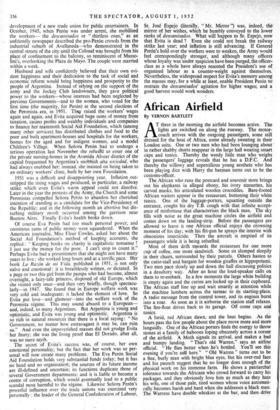Evita and After
By GEORGE BRINSMEAD UNTIL the coming of Evita, only one woman—a hand- some Irishwoman, " Madama " Lynch—had ever played a dominating part in the public affairs of a Latin American republic. La Lynch, in remote and backward Paraguay in the middle of the last century, dazzled the popu- lace with her Parisian finery; but she worked mostly behind the scenes. Eva Duarte de Peron, in the middle of our own century, came out into the open and, being a true child of the times, used all the latest devices of publicity to assist her in the fulfilling of her mission in the great and progressive republic of Argentina. Evita was gravely underrated by the British Press. The limelight distracted attention from the fact that she was an astute and capable stateswoman, a fanatical social reformer, and a warm and emotionally generous personality—though she was not lacking in feminine vindictiveness. Historians will certainly attach more importance to her achievement in 1945— when, at a most critical moment in his career, she was largely responsible for obtaining her friend Colonel Peron's release from arrest—and her subsequent success in enlarging the popu- lar basis of the Peronista regime, than to the abundance of her jewellery or the extravagance of her wardrobe. Few dema- gogues have had such a devoted, able and hard-working consort as had President Peron. Few women have received such adulation as was lavished upon Evita. A shrine will now be erected in her honour—probably in the extensive popular park that she created—which, as a place of pilgrimage, will rival the basilica of the Virgin of Lujan, on the outskirts of Buenos Aires.
Eva Duarte was born of humble, peasant parents in 1919, at Los Toldos (literally : " The Awnings ") in the flat and feature- less province of Buenos Aires. A celebrated author and states- man, Domingo Faustino Sarmiento, wrote of the pampa scenery : " I wonder what impression must be made on an Argentine by the simple act of fixing his eyes on the horizon of his country and seeing—and seeing nothing." For Seilorita Eva the empty horizon of the pampa was (as it had been in the eyes of the early Spanish conquistadores) the way to El Dorado. So the ambitious girl boarded the (at that time British-owned) train to glittering Buenos Aires. In the capital. a, few years later, she was not only a radio star known in every Argentine household, she had become interested, too, in the development of a new trade union for public entertainers. In October, 1945, when Peron was under arrest, she mobilised the workers— the descamisados or " shirtless ones," as an unfriendly newspaper described the pro-Peron crowds from the industrial suburb of Avellaneda—who demonstrated in the central streets of the city until the Colonel was brought from his place of confinement to the balcony, so reminiscent of Musso- lini's, overlooking the Plaza de Mayo. The couple were married within a week.
Husband and wife confidently believed that their own evi- dent happiness and their dedication to the task of social and economic reform would bring happiness and prosperity to the people of Argentina. Instead of relying on the support of the army and the Jockey Club landowners, they gave political power to the workers—whose interests had been neglected by previous Governments—and to the women, who voted for the first time (the majority, for Peron) at the second elections of the Peronista- era, in 1951. They raised the 'workers' wages again and again, and Evita acquired huge sums of money from taxation, casino profits and wealthy individuals and companies to finance her mammoth Social Aid Foundation, which (among many other services)- has distributed clothes and food to the poor and built apartment-houses and hospitals for the workers, homes for the aged and for indigent women, and a model Children's Village. When Senora Peron had to undergo a serious operation last November she refustd to enter one of the private nursing-homes in the Avenida Alvear district of the capital frequented by Argentina's snobbish alta sociedad, who had always snubbed her; instead, she insisted on being taken to an ordinary workers' clinic, built by her own Foundation.
1951 was a difficult and disappointing year. Inflation out- stripped the rising wages and produced, in particular, a railway strike which even Evita's warm appeal could not dissolve. Later in the year the protests of the Army, the Church and some Peronistas compelled Senora Peiron to abandon her cherished intention of standing as a candidate for the Vice-Presidency of the Republic; and in the following month an abortive but dis- turbing military revolt occurred among the garrison near Buenos Aires. Finally Evita's health broke down.
Of course Eva Peron had too much personal power, and enormous sums of public money were squandered. When the American journalist, Miss Fleur Cowles, asked her about the Social Aid Foundation's method of keeping accounts, she replied : " Keeping books on charity is capitalistic nonsense I I just use the money for the poor. I can't stop to count it."
Perhaps Evita had a presentiment that she might not have many years to live : she worked long hours and at a terrific pace. Her book La RazOtz de mi Vida, published in 1951,_ is not only naive and emotional : it is breathlessly written, or dictated. In a page or two this girl from the pampa who had become, almost overnight, a fairy-tale princess, disposed of old Europe, which she visited only once—and then very briefly, though spectacu- larly—in 1947. She found that in Europe welfare work was very cold and inadequate; it lacked the element of love. So Evita put love—and glamour—into the welfare work of the Peronista regime. This may sound absurd to a European— and, indeed, to many Argentines. But Argentina is young and optimistic. and Evita was young and optimistic. Argentina is so rich in natural resources that there is a local saying: " No Government, no matter how extravagant it may be, can ruin us." And even the impoverished masses did not grudge Evita her finery; she was the living proof that El Dorado, after all, was no mere myth. The secret of Evita's success was, of course, her own emotional personality; but the fact that her work was so per- sonal will now create many problems. The Eva Peron Social Aid Foundation holds very substantial funds today; but it has no head and no organisation; the sources of its future income are ill-defined and uncertain; its functions duplicate those of several Government departments; and it is liable to become a centre of corruption, which would..eventually lead to a public scandal most harmful to the regime. Likewise Senora Penion's powerful influence over the trade unions was exercised very personally : the leader of the General Confederation of Labour, Sr. Jose Espejo (literally, " Mr. Mirror') was, indeed, thd mirror of her wishes, which he humbly conveyed to the lower ranks of descamisados. What will happen to Sr. Espejo, now that Evita is dead ? Even she could not break the railway strike last year; and inflation is still advancing. If General PenSn's hold over the workers were to weaken, the Army would feel correspondingly stronger, and although many officers whose loyalty was under suspicion have been purged, the officer- class as a whole have always resented the President's use of organised labour as a counter-weight against themselves. Nevertheless, the widespread respect for Evita's memory among the masses may, for a while at least, enable President Peron to restrain the descamisados' agitation for higher wages; and a good harvest would work wonders.



























 Previous page
Previous page